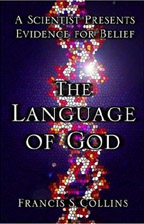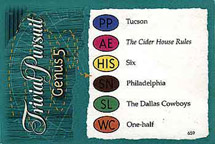
I just finished reading
The Language of God: A Scientist Presents Evidence for Belief by Francis S. Collins. I was rather disappointed with this book. Perhaps it was because it did not even come close to living up to its subtitle. Although I enjoyed the history refresher and the personal account of the author's "search for truth" this book presented no compelling evidence for belief.
Francis Collins has written a good book detailing the currently accepted scientific origin theories, the big bang and evolution. He then goes into great detail into his work on the human genome project. These chapters convince the reader that Collins deeply believes in the evidence that DNA and evolution are facts. Where the book falls short is when Collins is guilty of the "God of the Gaps" fallacy in order to prove his beliefs. That is that whenever we reach a point when we don't understand something we just attribute that act to God. Collin's contradicts himself by explaining how large, complex and mostly unexplored the human genome is and then claiming that certain things like the moral law and altruism cannot be explained by DNA alone. How can a scientist admit that something is unexplored and then a few paragraphs later assert what those unexplored parts can or can't do?
Collins later explains many of the historical conflicts between science and theology. This section is a pretty good review of these conflicts without getting too bogged down in specifics. I enjoyed these chapters however they offered nothing to support his stated purpose of the book and in most cases they painted theism in a very bad light.

In the early chapters Collins describes how a preacher introduced him to the writings of
C. S. Lewis. After reading "Mere Christianity" For the first few chapters Collins quoted Lewis on nearly every page. There are several other theologians and philosophers who have spoken at length about the moral law. It would have been nice if Collins could have referenced any one of them rather than relying solely on Lewis.
Collins accepts on faith the existence of a moral law. This is another place where he gets into a logical feedback loop. Collins believes, like Lewis and many others, that the very existence of good and evil, right and wrong, morality and immorality cannot be explained by nature. Since it can't be explained by nature then it most be caused by something outside of nature, God. Good exist because god created it, so if there is good there is god. Collins does not address the possibility that this premise may be flawed. In his mind morality itself is evidence of god. Morality simply cannot exist without god. I don't accept this premise so I had a very hard time with his later "proofs" since all of them were based on it.
Collins also misused Occam's Razor. In nearly every chapter he prefaced a conclusion with, "If you are willing to accept the existence of a God then...". With this preface to every conclusion his beliefs always seemed to be the simpler solution to the problem. But, remove this qualifier and Collins' conclusions loose their bite.
I think one of the problems is that Collins is very good at playing the Devil's advocate when he's explaining the opposing views since he actually held and embraced those views for decades. Unfortunately for the sake of his conclusion, he makes that case better than he makes one he intended to.
At the end Collins tries to make his beliefs line up with Christianity and discusses many issues in bioethics. I found these chapters enjoyable but they hardly supported his thesis.
I'd recommend this book to anyone who is interested in getting their feet wet on this issue but, contrary to the subtitle, there is nothing in it that could actually be called "evidence for belief."







